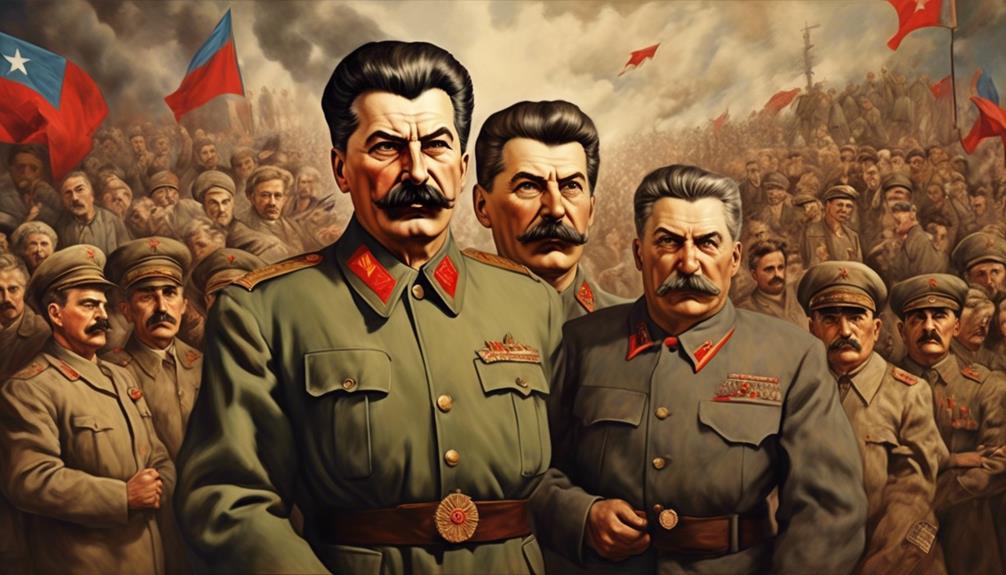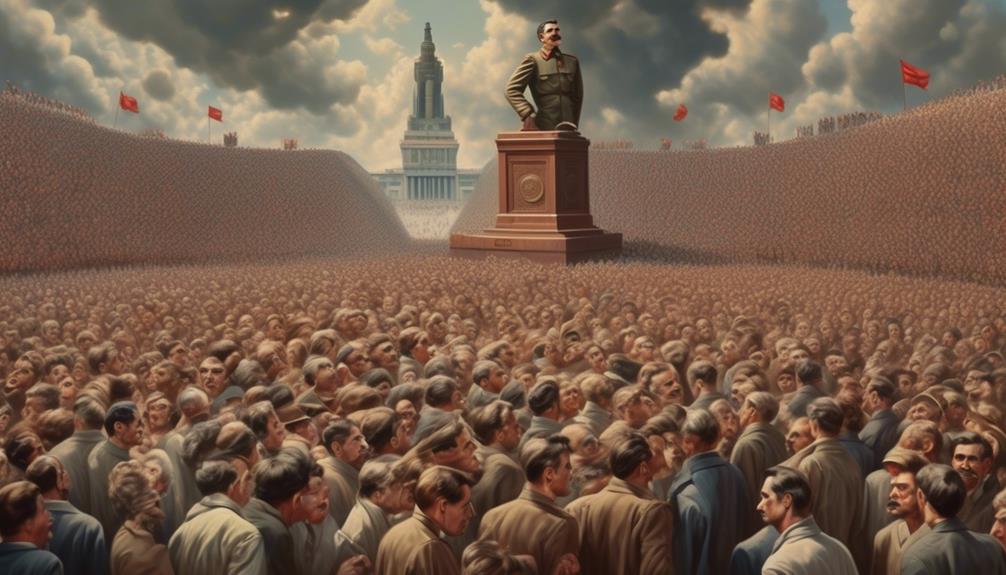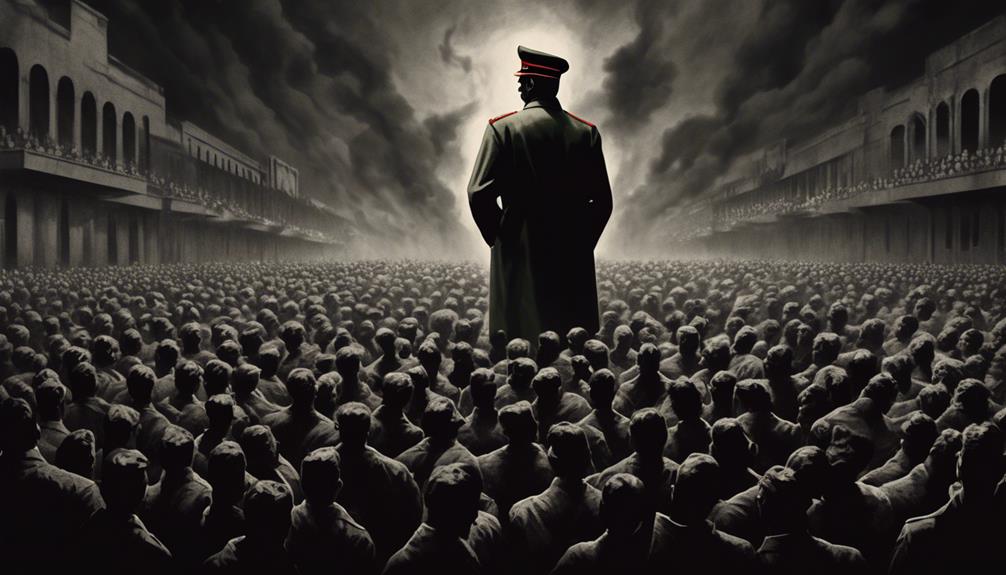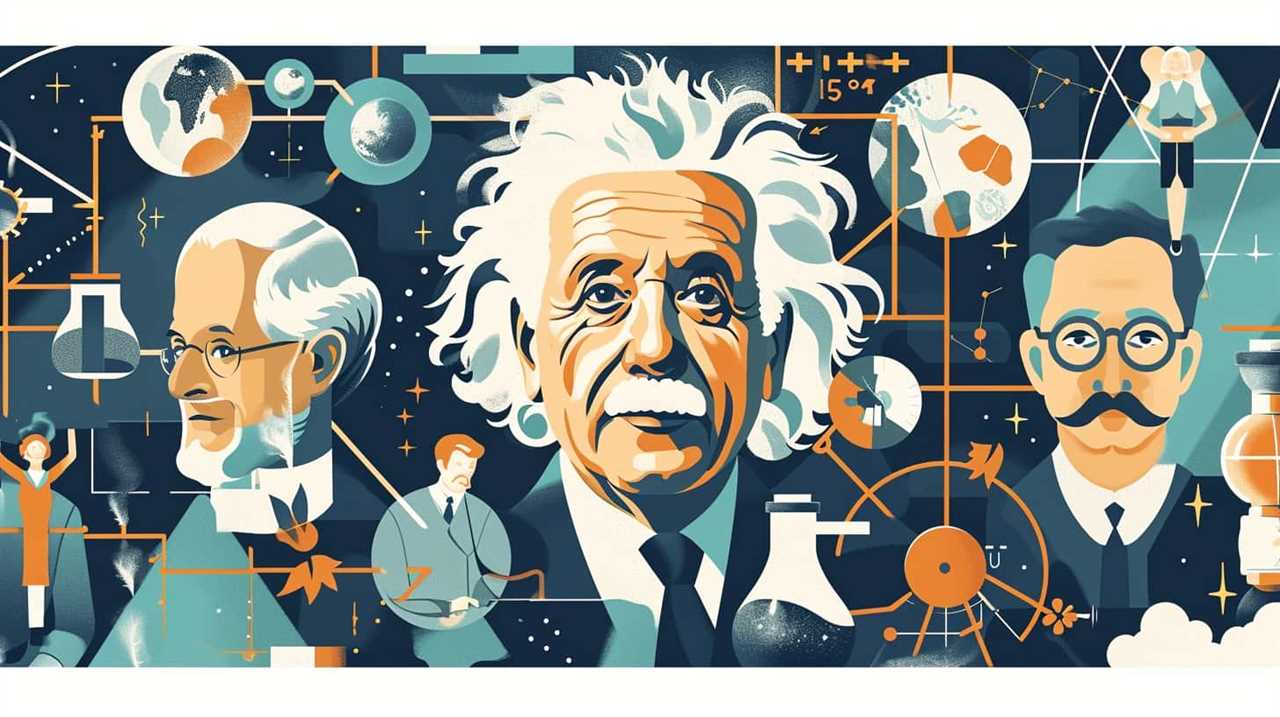Famous Personalities
Joseph Stalin Quotes – Communist Leader, Soviet Union Dictator

As authors, we frequently find inspiration in the sayings of notable personalities from history. Joseph Stalin, the communist ruler and tyrant of the Soviet Union, is one example of such a figure.
Stalin's quotes provide insight into his ideology and the methods he employed to maintain control over his regime. Through the use of totalitarianism, propaganda, and a ruthless pursuit of enemies, Stalin aimed to shape the narrative of his rule.
His manipulation of history and the creation of a cult of personality further exemplify his desire for absolute power. In this introduction, we will explore the quotes of Joseph Stalin, shedding light on his vision for a socialist state, his brutal purge of the party, and the lasting legacy of his dictatorship.
Key Takeaways
- Joseph Stalin implemented totalitarian control over every aspect of Soviet society, including the economy, politics, culture, and daily lives of citizens.
- Stalin extensively used propaganda to manipulate public opinion, shape beliefs, and control the narrative to serve his interests.
- Stalin persecuted and ruthlessly pursued individuals perceived as enemies of the state, employing purges, forced labor camps, secret police, show trials, and censorship.
- The lasting legacy of Stalin's dictatorship includes millions of deaths, widespread suffering, fear, and repression, as well as the influence of his industrialization policies on the Soviet Union's economic and social development.
Stalin's Belief in Totalitarian Control
Stalin firmly believed in the implementation of totalitarian control, which allowed him to exert complete authority over every aspect of Soviet society. This belief formed the foundation of his ideology and guided his actions as the leader of the Soviet Union. Totalitarian control, as defined by Stalin, meant absolute power and control over the economy, politics, culture, and daily lives of Soviet citizens.
Stalin's ideology aimed to transform the Soviet Union into a socialist utopia, where the state had complete control over all aspects of society. He believed that this level of control was necessary to ensure the rapid industrialization and modernization of the country. Stalin was convinced that only through strict central planning and state intervention could the Soviet Union catch up with the capitalist West and become a global superpower.
To achieve this vision, Stalin implemented a series of policies and measures that consolidated his power and suppressed any opposition. He purged the Communist Party of perceived threats, implemented collectivization of agriculture, and initiated the Five-Year Plans, which aimed to rapidly industrialize the nation. Through these actions, Stalin sought to solidify his control and create a society that adhered strictly to his ideological principles.
The Power of Propaganda in Stalin's Regime

Propaganda played a crucial role in shaping and reinforcing the beliefs and actions of the Soviet population under Stalin's regime. The impact of propaganda on society was immense, as it effectively manipulated public opinion and controlled the narrative to serve Stalin's interests. Here are three key ways in which propaganda influenced Soviet society:
- Indoctrination: Propaganda was used to instill loyalty and devotion to Stalin and the Communist Party. Through relentless campaigns, the population was constantly bombarded with messages praising Stalin's leadership and promoting the ideals of communism. This indoctrination created a sense of unity and purpose among the Soviet people, reinforcing their commitment to the regime.
- Demonization of Enemies: Propaganda was also used to vilify perceived enemies of the state, such as political dissidents, capitalists, and foreign powers. By portraying these individuals and groups as threats to the socialist cause, propaganda justified the regime's oppressive measures and consolidated its power. The demonization of enemies also fostered a climate of fear and suspicion within society, discouraging dissent and reinforcing conformity.
- Cult of Personality: Stalin was elevated to the status of a deity through propaganda. Portrayed as the benevolent father figure and savior of the Soviet Union, Stalin's image was ubiquitous in public spaces and media. This cult of personality not only reinforced his authority but also created a sense of awe and adoration among the population. It further solidified the regime's control by making any criticism of Stalin tantamount to treason.
Stalin's Ruthless Pursuit of Enemies
During Stalin's rule, individuals perceived as enemies of the state faced relentless persecution and a ruthless pursuit to eliminate any dissent or opposition. Stalin's ruthlessness in leadership had a profound impact on Soviet society, as it created an atmosphere of fear and suspicion, where citizens were hesitant to express their true opinions or challenge the regime.
To understand the extent of Stalin's pursuit of enemies, let us examine a table showcasing some of the methods employed by his regime:
| Methods of Persecution | Examples |
|---|---|
| Purges | The Great Purge of 1936-1938 |
| Forced Labor Camps | Gulags where perceived enemies were sent |
| Secret Police | NKVD, responsible for surveillance and arrests |
| Show Trials | Public trials used to justify purges and executions |
| Censorship and Propaganda | Control of media and dissemination of state ideology |
The Great Purge, one of the darkest chapters in Soviet history, saw thousands of party officials, intellectuals, and ordinary citizens executed or sent to labor camps. Stalin's secret police, the NKVD, carried out mass arrests, torture, and extrajudicial killings to instill fear and maintain control. Show trials were conducted to provide a veneer of legality to these repressions, with confessions often coerced through torture.
The impact on Soviet society was devastating. People lived in constant fear of being denounced by their neighbors, colleagues, or even family members. The pursuit of enemies created a climate of mistrust, where self-preservation became the primary concern. Intellectual and artistic creativity suffered, as censorship stifled freedom of expression. The elimination of perceived enemies also weakened the country's leadership, removing experienced individuals and leaving a void that hindered effective governance.
Stalin's Manipulation of History

Stalin's manipulation of history was a key component of his regime's control over the Soviet Union. Through censorship of historical records, Stalin was able to shape the narrative to fit his own agenda and suppress any information that contradicted his desired version of events.
Additionally, propaganda and the rewriting of narratives further solidified his grip on power by presenting a distorted view of history that portrayed Stalin as a heroic figure. Dissenting voices were ruthlessly suppressed, ensuring that only the state-approved version of history was disseminated to the masses.
Censorship of Historical Records
The manipulation of historical records during Joseph Stalin's regime has had a profound impact on our understanding of the past. This censorship of historical records was a deliberate attempt by Stalin to control the narrative and promote his own version of history. It had the following effects:
- Distortion of the truth: By censoring and altering historical records, Stalin was able to create a version of history that aligned with his ideology and political agenda. This led to a distortion of the truth and an inaccurate portrayal of events.
- Suppression of dissent: Censorship of historical records allowed Stalin to suppress any information or evidence that contradicted his regime's policies. This stifled intellectual freedom and critical thinking, preventing the public from accessing alternative perspectives and ideas.
- Historical revisionism: Stalin's manipulation of historical records involved rewriting history to fit his narrative. This not only erased the contributions and experiences of certain individuals and groups but also created a false historical legacy for Stalin himself.
The censorship of historical records under Stalin's regime continues to impact our understanding of the past, highlighting the importance of preserving and critically examining historical sources.
Propaganda and Rewriting Narratives
Propaganda and the rewriting of narratives played a significant role in shaping the historical perspective during Joseph Stalin's rule. Stalin recognized the power of controlling information and used it to his advantage in order to maintain his grip on power. One of the ways he accomplished this was through the manipulation of truth and the rewriting of history to fit his own narrative. By controlling the media and censoring dissenting voices, Stalin was able to shape the historical record in a way that glorified his regime and suppressed any opposition. This rewriting of history allowed Stalin to present himself as a heroic figure, while erasing any evidence of his atrocities and failures.
To illustrate this manipulation of truth, consider the following table:
| Rewritten Narrative | Truth |
|---|---|
| Stalin as a great leader who saved the Soviet Union from external threats | Stalin's policies caused millions of deaths through famine and purges |
| The Soviet Union as a prosperous and powerful nation under Stalin's rule | The Soviet Union faced economic stagnation and widespread poverty |
| Stalin as the architect of a successful communist revolution | The revolution was marred by violence and the suppression of dissenting voices |
Through the rewriting of history, Stalin was able to create a distorted narrative that justified his brutal rule and masked the true nature of his regime. This manipulation of truth not only deceived the Soviet people, but also had a lasting impact on how Stalin is remembered in history. It serves as a stark reminder of the dangers of allowing those in power to control the narrative and rewrite history for their own gain.
Suppression of Dissenting Voices
Dissenting voices were systematically suppressed under Joseph Stalin's regime, as he employed various tactics to manipulate history and maintain absolute control over the narrative. The consequences of this censorship were far-reaching and had a profound impact on both individuals and society as a whole. Here are three key ways in which the suppression of dissenting voices shaped the Soviet Union under Stalin:
- Silencing opposition: By censoring and suppressing alternative viewpoints, Stalin effectively silenced any opposition to his rule. This created an environment of fear and conformity, where individuals were afraid to express their true thoughts and beliefs.
- Control over information: By controlling the narrative and manipulating historical records, Stalin was able to shape public opinion and maintain his grip on power. This allowed him to present himself as a heroic figure and justify his actions, while hiding the true extent of his atrocities.
- Legacy of fear: The suppression of dissenting voices created a culture of fear and distrust, where individuals lived in constant apprehension of being denounced or punished for expressing their opinions. This legacy of fear continued long after Stalin's reign, leaving a lasting impact on Soviet society.
The consequences of Stalin's censorship and suppression of dissenting voices were severe, leading to the stifling of intellectual freedom, the erasure of alternative perspectives, and the perpetuation of a dangerous cult of personality.
The Cult of Personality Surrounding Stalin

Throughout his rule, Joseph Stalin fostered a pervasive cult of personality that sought to elevate his image and consolidate his power. This cult of personality was achieved through various means, including the manipulation of history to glorify Stalin and his accomplishments. By controlling the narrative, Stalin was able to shape public opinion and maintain his grip on power.
To understand the extent of the cult of personality surrounding Stalin, let us examine its key features:
| Features | Description |
|---|---|
| Propaganda Machine | Stalin utilized an extensive propaganda machine to promote his image as a strong and infallible leader. His image was plastered across the country, and his achievements were exaggerated and celebrated. |
| Suppression of Dissent | Any dissent or criticism of Stalin was swiftly suppressed, ensuring that only positive narratives about him were allowed to circulate. This created an environment of fear and conformity. |
| Rewriting of History | Stalin manipulated historical records to portray himself as the rightful successor to Lenin and downplayed the contributions of other political figures. His role in the Russian Revolution was exaggerated to cement his status as a heroic leader. |
Stalin's Justification of Collectivization

Stalin's justification for collectivization of agriculture was rooted in his belief that it would lead to increased productivity, modernization, and the rapid industrialization of the Soviet Union.
- Enhanced Productivity: Stalin argued that by consolidating individual farms into collective units, the use of modern machinery and technology would be maximized. This, in turn, would boost agricultural output and provide surplus food for the growing urban population.
- Modernization: Stalin believed that collectivization would enable the adoption of more efficient farming methods and practices, such as crop rotation and scientific breeding. These advancements would help transform the largely backward agricultural sector into a modern industry capable of meeting the demands of a rapidly industrializing nation.
- Economic Equality: Another key aspect of Stalin's justification was the promise of economic equality. He argued that by eliminating private ownership of land, collectivization would ensure a fair distribution of resources and wealth. This would create a more equitable society, where the rural population would enjoy the benefits of industrialization and urbanization.
While Stalin's justifications for collectivization held promise in theory, the implementation of this policy led to significant hardships for the peasantry. Forced collectivization, along with the elimination of individual incentives, resulted in widespread resistance, decreased agricultural output, and the loss of countless lives during the ensuing famines. Despite its intended goals, collectivization ultimately failed to achieve the desired economic equality and industrialization envisioned by Stalin.
Stalin's Vision for a Socialist State

Stalin's vision for a socialist state encompassed two key points: economic equality and centralized state control.
In his pursuit of economic equality, Stalin believed in redistributing wealth and resources to ensure that all citizens had access to basic necessities. This involved collectivization of agriculture and nationalization of industries.
Additionally, Stalin advocated for a centralized state control, where the government had complete authority over decision-making and planning. This allowed for a planned economy where resources could be allocated efficiently and according to the needs of the state.
Economic Equality in Socialism
In examining the vision for a socialist state, one can observe the importance placed on achieving economic equality as a fundamental principle. This principle is rooted in the socialist belief that wealth should be distributed more equitably among all members of society.
Here are three key aspects of economic equality in socialism:
- Economic redistribution: Socialism seeks to redistribute wealth and resources to ensure that everyone has access to basic necessities and opportunities. This involves taxing the wealthy and providing social programs to support the less fortunate.
- Socialist principles: Economic equality is seen as a means to achieve social justice and eliminate class divisions. By ensuring that everyone has equal access to resources, education, and healthcare, socialism aims to create a more equitable society.
- Challenging capitalism: Socialism challenges the capitalist system, which is seen as perpetuating inequality and exploitation. By prioritizing economic equality, socialism seeks to dismantle the hierarchies and power imbalances inherent in capitalism.
Centralized State Control
To further explore the implementation of economic equality in socialism, it's crucial to examine the concept of centralized state control as envisioned by Joseph Stalin for a socialist state.
Stalin believed in the establishment of a centralized authority that would exercise state power in all aspects of society. He advocated for a strong government that would have control over the economy, production, and distribution of resources. This approach aimed to ensure that the state had the power to direct and regulate all economic activities, leading to a planned economy.
Stalin's Brutal Purge of the Party

Did Stalin's brutal purge of the party lead to significant changes in the Soviet Union's political landscape?
- Loss of Lives: The brutality of Stalin's purges resulted in the loss of millions of lives. Party members accused of disloyalty or opposition to Stalin's rule were arrested, imprisoned, and often executed. This widespread fear and paranoia within the party led to a climate of terror and distrust, where even innocent individuals were targeted and punished.
- Weakening of Party Structure: The impact on the party structure was significant. Stalin's purges eliminated many experienced and capable party members, leaving a void in leadership positions. This weakened the party's ability to govern effectively and reduced its institutional strength. The purges also instilled a culture of fear, where party members were hesitant to express dissenting opinions, leading to a lack of critical thinking and stifling of creativity within the party.
- Consolidation of Power: Stalin's brutal purge of the party allowed him to consolidate his power and establish himself as the undisputed leader of the Soviet Union. By eliminating potential rivals and dissenters, Stalin ensured his dominance and control over all aspects of the party and the state. This consolidation of power enabled him to implement his policies and ideology without significant opposition.
Stalin's Contempt for Individual Rights

Stalin's contempt for individual rights was evident through his suppression of dissent and his prioritization of the collective over the individual.
Under his rule, any form of opposition or criticism was met with severe consequences, including imprisonment, exile, and even execution.
This disregard for individual rights allowed Stalin to maintain absolute control, but it came at the cost of freedom and human rights for the people.
Suppression of Dissent
With a contempt for individual rights, Joseph Stalin actively suppressed dissent during his rule. His use of propaganda and manipulation of historical records were key tools in maintaining his iron grip on power. Here are three chilling ways in which Stalin suppressed dissent:
- Political Purges: Stalin executed a series of purges to eliminate perceived threats to his regime. Party members, military officials, intellectuals, and ordinary citizens were targeted, resulting in mass arrests, show trials, and executions. This created an atmosphere of fear and ensured loyalty to the regime.
- Censorship and Propaganda: Stalin tightly controlled the media and used propaganda to shape public opinion. Dissenting voices were silenced, and only information that supported the regime's narrative was allowed. This manipulation of information further restricted dissent and reinforced the cult of personality around Stalin.
- Rewriting History: Stalin manipulated historical records to portray himself as a heroic leader and erase any mention of his mistakes or atrocities. Textbooks, archives, and museums were all subject to revision, distorting the truth and preventing any alternative narratives from emerging.
Through these methods, Stalin suppressed dissent and consolidated his power, leaving a legacy of fear and oppression.
Collective Over Individual
Suppression of dissent wasn't the only way Joseph Stalin exerted his control; his contempt for individual rights was evident in his prioritization of collective interests over those of the individual. Stalin believed that individualism threatened the goals of the state and hindered societal harmony. He emphasized collective responsibility, advocating for the subjugation of individual needs and desires to the greater good of the collective.
Stalin's policies aimed at creating a unified and homogenous society, where everyone worked towards a common goal. This disregard for individual rights manifested in various forms, such as the collectivization of agriculture and the elimination of private property, which aimed to ensure equal distribution of resources among the masses.
Stalin's approach ultimately sacrificed individual liberties for the sake of maintaining social order and advancing the communist ideology.
Stalin's Legacy: Lessons From a Dictator

One can't underestimate the importance of studying Joseph Stalin's legacy as a dictator in order to learn valuable lessons for the future. Despite the atrocities committed during his rule, it's crucial to analyze the impact of Stalin's policies and the long-lasting effects they had on the Soviet Union and the world.
- Human Rights Violations: Stalin's rule was marked by widespread human rights abuses, including forced labor camps, purges, and mass executions. By examining these violations, we can understand the importance of safeguarding individual liberties and the dangers of unchecked power.
- Centralized Control: Stalin's policies aimed at consolidating power in the hands of the state resulted in a highly centralized government. This concentration of authority stifled individual freedoms, creativity, and innovation. It's essential to recognize the value of decentralization and the importance of fostering a pluralistic society.
- Cult of Personality: Stalin cultivated a personality cult that portrayed him as an infallible leader. This manipulation of public perception highlights the dangers of unchecked propaganda and the need for a critical and informed citizenry.
Frequently Asked Questions
What Were Some of the Specific Tactics Used by Stalin to Manipulate History in the Soviet Union?
Some of the specific tactics used by Stalin to manipulate history in the Soviet Union included:
- Censorship: By controlling the information that reached the public, Stalin was able to shape the perception of events and individuals to fit his desired narrative.
- Propaganda: Stalin utilized propaganda to spread his ideology and promote his image as a great leader. This involved the dissemination of biased information, often through state-controlled media outlets.
- Rewriting historical narratives: Stalin actively altered historical records to align with his own version of events. This included editing or omitting information that contradicted his regime or glorifying certain aspects of Soviet history.
Additionally, Stalin's pursuit of enemies, which included purges and show trials, had a profound impact on Soviet citizens. These tactics instilled fear and distrust within society, as individuals were constantly under surveillance and suspected of disloyalty.
Ultimately, these tactics allowed Stalin to consolidate power and maintain control over the Soviet Union. They ensured that his version of history prevailed and that dissenting voices were silenced or discredited.
How Did Stalin's Pursuit of Enemies in His Regime Impact the Everyday Lives of Soviet Citizens?
Stalin's pursuit of enemies in his regime had a profound impact on the everyday lives of Soviet citizens. The atmosphere of fear and suspicion created by Stalin's purges and show trials permeated society, leading to a climate of constant vigilance and paranoia.
People lived in constant fear of being labeled as enemies of the state, which resulted in self-censorship and the erosion of trust within communities.
This psychological manipulation had a detrimental effect on the social fabric of Soviet society, leaving lasting scars on the collective psyche of its citizens.
What Were Some of the Key Elements of the Cult of Personality Surrounding Stalin and How Did It Contribute to His Power?
Some key elements of Stalin's cult of personality included propaganda, censorship, and the promotion of his image as a strong and infallible leader. This cult of personality contributed to his power by creating a sense of devotion and loyalty among the Soviet population.
Stalin's image was carefully crafted to portray him as the embodiment of the Communist ideal and the savior of the Soviet Union. This allowed him to consolidate his power and suppress dissent, ultimately solidifying his control over the country.
What Were Some of the Justifications Stalin Provided for His Policy of Collectivization and How Did It Impact the Agricultural Sector in the Soviet Union?
Stalin's collectivization policy was justified by the need to modernize agriculture and increase food production in the Soviet Union. However, its impact on the agricultural sector was profound.
The forced consolidation of farms led to significant economic consequences, including decreased productivity and widespread famine. Additionally, resistance from peasants resulted in violent repression and the loss of millions of lives.
What Lessons Can Be Learned From Stalin's Legacy as a Dictator and How Have They Influenced Political Systems Around the World?
Lessons learned from Stalin's legacy as a dictator have had a significant global influence on political systems around the world. By studying his methods and policies, we can better understand the dangers of totalitarianism, the importance of human rights, and the need for checks and balances in government.
Stalin's brutal regime serves as a stark reminder of the potential consequences of unchecked power and the importance of fostering democracy, transparency, and accountability in political systems.
What similarities or differences can be found in the quotes of Joseph Stalin and Benito Mussolini as dictators and leaders?
Both Joseph Stalin and Benito Mussolini quotes fascist leader reflect their strong and authoritative leadership styles. While both leaders were known for their dictatorial rule, Stalin’s quotes often emphasized control and discipline, while Mussolini’s quotes emphasized nationalism and unity. Despite their differences, both leaders used propaganda to maintain power.
Conclusion
In conclusion, Joseph Stalin's reign as the leader and dictator of the Soviet Union was marked by his unwavering belief in totalitarian control. Through the power of propaganda, ruthless pursuit of enemies, manipulation of history, and the creation of a cult of personality, Stalin established a vision for a socialist state that disregarded individual rights.
His brutal purge of the party and contempt for dissenting voices left a lasting legacy of fear and oppression. Truly, Stalin's reign serves as a stark reminder of the dangers of unchecked power and the importance of safeguarding democracy.
Joy, as our Editor in Chief, ensures the highest standard of content. Her talent in writing is complemented by her attention to detail and passion for literature and culture. Joy’s expertise and love for the English language shine through in her editorial work, making each piece a testament to quality and clarity.
Philosophers Quotations
Why Do Technology Wisdom Quotes Resonate So Deeply?

Why on earth do these technology wisdom quotes resonate so deeply with us? It’s almost as if these little nuggets of insight have the power to revolutionize our thinking and propel us towards innovation. But why?
Well, let’s dive deep into the realm of technology and uncover the secrets behind these captivating quotes. From the influential words of tech visionaries to the philosophical musings on the ethical implications of advancement, these quotes offer a unique perspective on the ever-evolving world of technology.
They challenge our preconceived notions, expose cultural biases, and shape our perception of the future. So buckle up, fellow innovators, as we embark on a journey to unravel the profound impact of technology wisdom quotes.
Key Takeaways
- Technology wisdom quotes inspire and motivate us to embrace innovation and drive us towards new ideas and solutions.
- Words have the power to challenge the status quo, reshape our thinking, and push the boundaries of what is possible in technology.
- Philosophers provide valuable insights into the impact and implications of technology, from critical thinking to exploring the essence of technology and its influence on our existence.
- Technology reflects the values and priorities of society, both in advancements that enhance lives and in potential negative effects that reinforce societal hierarchies.

The Influence of Technology Quotes
One major influence of technology quotes is their ability to inspire and motivate us to embrace the power of innovation. These quotes, often shared by influential figures in technology, have the potential to shape our thinking and drive us towards new ideas and solutions. They serve as reminders of the incredible progress that has been made in the field and the limitless possibilities that lie ahead.
Technology quotes have played a significant role in the evolution of technology thinking. They’ve helped us recognize the transformative impact of technology on our lives and the world around us. By highlighting the achievements and breakthroughs of visionaries in the industry, these quotes have sparked a sense of curiosity and a desire for exploration.
Moreover, technology quotes have the ability to challenge our conventional thinking and push us beyond our comfort zones. They encourage us to question the status quo and embrace the unknown. Through their words, influential figures in technology have instilled in us a sense of determination and resilience, reminding us that failure is just a stepping stone towards success.

The Power of Words in Technology
How do the words spoken by influential figures in technology demonstrate the power they hold in shaping our thinking and driving innovation? The power of words in technology lies in their ability to inspire, motivate, and transform. When influential figures in technology express their ideas and insights through powerful words, they have the potential to ignite a spark of innovation and change within us.
Words have the power to challenge the status quo, to question existing norms, and to push the boundaries of what is possible. They can convey transformative ideas that open up new possibilities and inspire us to think differently. When we hear these powerful words, they have the ability to reshape our thinking, to challenge our beliefs, and to propel us towards innovation.
To illustrate the impact of powerful words in technology, let’s consider the following table:
| Influential Figure | Quote | Impact |
|---|---|---|
| Steve Jobs | "Stay hungry, stay foolish." | Encourages taking risks and embracing curiosity. |
| Elon Musk | "The first step is to establish that something is possible; then probability will occur." | Inspires a mindset of overcoming challenges and pursuing ambitious goals. |
| Sheryl Sandberg | "Done is better than perfect." | Encourages taking action and embracing imperfections. |
| Bill Gates | "Your most unhappy customers are your greatest source of learning." | Promotes a customer-centric approach to innovation. |
| Mark Zuckerberg | "The biggest risk is not taking any risk." | Encourages stepping outside of comfort zones and embracing uncertainty. |
These quotes exemplify the power of words in technology, as they encapsulate transformative ideas that have the potential to shape our thinking and drive innovation. By internalizing these powerful words and embracing the ideas they convey, we can tap into our own potential and make meaningful contributions to the world of technology.

Wisdom From Philosophers on Technology
Technology wisdom quotes from philosophers offer valuable insights into the impact of technology on society and guide our understanding of its role in shaping our lives. These influential philosophers have provided profound reflections on technological progress, shedding light on the complexities and implications of our ever-evolving digital world. Here are four key ideas from these thinkers:
- Socrates: The ancient Greek philosopher cautioned against the blind adoption of technology, emphasizing the importance of critical thinking and self-reflection. He believed that true wisdom lies in understanding oneself and the impact of technology on our individual and collective well-being.
- Martin Heidegger: This existential philosopher explored the essence of technology, arguing that it isn’t merely a neutral tool but a powerful force that shapes our existence. He urged us to reflect on the ways in which technology influences our perception of the world and our relationship with it.
- Marshall McLuhan: McLuhan, a prominent media theorist, famously stated, ‘The medium is the message.’ He highlighted how technology alters our modes of communication and shapes our understanding of reality. McLuhan’s insights remind us to critically examine the medium through which information is transmitted.
- Donna Haraway: Haraway’s concept of the cyborg challenges traditional notions of identity and the boundaries between humans and machines. Her work invites us to embrace the possibilities of technology while remaining aware of its potential to reinforce societal hierarchies and power imbalances.

Technology as a Reflection of Society
Our daily interactions with technology provide us with a vivid snapshot of the values and priorities of our society.
Technology and social progress go hand in hand, as advancements in technology often reflect our desire to improve our lives and make progress as a society.
The relationship between technology and human values is complex and multifaceted. On one hand, technology has the potential to enhance our lives, increase efficiency, and promote connectivity.
On the other hand, it can also lead to unintended consequences and ethical dilemmas. For example, the rise of social media has brought about both positive and negative impacts on society, such as facilitating global communication and sparking political movements, but also contributing to issues like cyberbullying and privacy concerns.
As technology continues to evolve, it’s important for us to critically examine the values embedded within it and ensure that they align with our collective vision for a just and equitable society.

The Role of Philosophy in Understanding Technology
As we delve deeper into understanding technology, it becomes evident that philosophy plays a crucial role in unraveling its complexities. Here are four reasons why the role of philosophy is essential in understanding technology:
- Role of Ethics: Philosophy helps us analyze the ethical implications of technology. It forces us to question whether certain advancements are morally justified and guides us in making responsible decisions. For example, when developing artificial intelligence, philosophers consider the ethical implications of granting machines the power to make decisions that affect human lives.
- Philosophical Implications: Technology raises profound philosophical questions about the nature of consciousness, reality, and human existence. Philosophers examine the impact of technology on our perception of reality and challenge the boundaries between the physical and virtual worlds. They explore the implications of technologies like virtual reality and brain-computer interfaces on our understanding of the self.
- Ethical Guidelines: Philosophy provides us with the tools to develop ethical guidelines to govern the use of technology. It helps us establish principles and frameworks for responsible innovation, ensuring that technology is used for the betterment of society and doesn’t cause harm.
- Critical Thinking: Philosophy encourages critical thinking, enabling us to critically evaluate the impact of technology on society. It helps us question assumptions, challenge biases, and consider alternative perspectives, fostering a more nuanced understanding of the implications of technological advancements.

Quotes That Inspire Technological Innovation
After examining the role of philosophy in understanding technology, we can now explore how quotes that inspire technological innovation have a profound impact on our mindset.
Technology quotes serve as powerful catalysts for innovation, providing us with the inspiration and motivation to push the boundaries of what’s possible.
Innovation is the lifeblood of progress, and it’s through the words of visionaries that we find the courage to challenge the status quo. Quotes like Steve Jobs’ ‘Innovation distinguishes between a leader and a follower’ remind us that innovation isn’t just about creating something new, but also about blazing our own trail and leading the way.
These quotes act as beacons of wisdom, guiding us through the complexities of technological advancements. They ignite a fire within us, urging us to think outside the box and pursue unconventional solutions. Quotes like Nikola Tesla’s ‘The present is theirs; the future, for which I really worked, is mine’ remind us of the transformative power of our ideas and the impact they can have on shaping the future.
Innovation inspiration can come from unexpected sources. Quotes from diverse fields, such as art, science, and literature, can offer fresh perspectives and spark new ideas. As Albert Einstein said, ‘Imagination is more important than knowledge. For knowledge is limited, whereas imagination embraces the entire world, stimulating progress, giving birth to evolution.’ It’s through this fusion of imagination and knowledge that true innovation is born.
Technology quotes have the ability to shift our mindset and challenge us to think differently. They remind us that innovation isn’t just about creating new gadgets or software, but about pushing the boundaries of what’s possible and making a positive impact on the world.
As we strive for innovation, let’s embrace the wisdom and inspiration that these quotes offer and let them guide us on our path to technological advancement.

Technology Quotes That Challenge Assumptions
When it comes to technology, assumptions often go unquestioned. However, technology quotes that challenge these assumptions can have a profound impact.
They force us to reevaluate our beliefs, push the boundaries of what’s possible, and drive innovation forward.
Challenging Tech Assumptions
While exploring the topic of challenging tech assumptions, we discovered technology quotes that provoke critical thinking and question our preconceived notions. These quotes challenge the ethics and assumptions that underpin our technological progress.
Here are four thought-provoking quotes that challenge our assumptions:
- ‘Technology is a useful servant but a dangerous master.’ – Christian Lous Lange
- ‘The real danger isn’t that computers will begin to think like men, but that men will begin to think like computers.’ – Sydney J. Harris
- ‘Technology is nothing. What’s important is that you have a faith in people, that they’re basically good and smart, and if you give them tools, they’ll do wonderful things with them.’ – Steve Jobs
- ‘The greatest danger in modern technology isn’t that machines will begin to think like humans, but that humans will begin to think like machines.’ – John McCarthy
These quotes challenge us to question the ethical implications of our technological advancements and remind us that it’s up to us to ensure that technology serves humanity rather than dominates it.
As we delve deeper into the impact of wise quotes, we’ll explore how these challenging thoughts can shape our perspective on technology.
Impact of Wise Quotes
As we delve into the impact of wise quotes that challenge assumptions, we can observe how these thought-provoking technology quotes resonate deeply within us. These quotes have the power to disrupt our existing beliefs and challenge the assumptions we hold about technology. They force us to question the status quo and push the boundaries of what’s possible.
The impact of these quotes is profound, as they inspire us to think differently, to innovate, and to strive for greatness. They’ve the ability to shape our mindset and influence our decisions, driving us towards new solutions and breakthroughs.
The influence of wisdom contained in these quotes is undeniable, as they serve as catalysts for change and propel us towards a future of endless possibilities.

Technology Quotes That Provoke Critical Thinking
As we explore the topic of technology quotes that provoke critical thinking, it becomes evident that these quotes have a profound impact on our perception and understanding of technology.
Thought-provoking tech quotes challenge our assumptions and encourage us to question the status quo.
These quotes serve as catalysts for inspiring critical thinking, pushing us to explore new ideas and possibilities in the ever-evolving world of technology.
Impact of Technology Quotes
One key impact of technology quotes that provoke critical thinking is their ability to inspire and challenge our perspectives. Here are four ways in which these quotes can have a profound influence on our thinking:
- Encouraging Innovation: Technology quotes that push us to think outside the box can inspire us to come up with innovative solutions to complex problems. They remind us that there are always new possibilities and that we have the power to shape the future.
- Highlighting Ethical Considerations: Technology quotes that provoke critical thinking often raise important ethical questions about the impact of technology on society. They remind us to critically examine the consequences of our actions and ensure that technology is used for the greater good.
- Promoting Self-Reflection: These quotes challenge us to reflect on our own attitudes and behaviors towards technology. They encourage us to question our reliance on technology and consider how it may be shaping our lives and relationships.
- Driving Change: Technology quotes that provoke critical thinking can inspire individuals and communities to take action and drive meaningful change. They remind us that we have the power to shape the future of technology and use it to create a better world.
The power of words in technology is undeniable, and these quotes have the ability to spark important conversations and drive innovation in the ever-evolving world of technology.
Thought-Provoking Tech Quotes
These thought-provoking tech quotes continue to challenge and inspire us, prompting critical thinking and sparking important conversations about the ever-evolving world of technology. They serve as powerful reminders of the impact that technology has on our lives and the potential it holds for shaping our future. These influential quotes seamlessly merge technology and philosophy, forcing us to consider the deeper implications of our digital age. They push us to question our reliance on technology, to examine the ethical dilemmas it presents, and to ponder the boundaries of human capability. Take, for instance, the following thought-provoking tech quotes:
| Quote | Author |
|---|---|
| "The technology we create, creates us." | Neil Postman |
| "Any sufficiently advanced technology is indistinguishable from magic." | Arthur C. Clarke |
| "We are stuck with technology when what we really want is just stuff that works." | Douglas Adams |
These quotes challenge us to think critically about the role of technology in our lives and the impact it has on our perception of reality. They encourage us to explore the intersection of technology and philosophy, inviting us to contemplate the profound questions that arise from our increasingly connected world.
Inspiring Critical Thinking
Exploring thought-provoking tech quotes inspires us to engage in critical thinking about the complex implications and consequences of technology in our lives. These quotes not only provide us with insightful perspectives, but they also challenge us to question our assumptions and explore new possibilities.
Here are four ways in which inspiring tech quotes can foster innovation and creativity:
- Encouraging us to think beyond limitations: Thought-provoking quotes push us to think outside the box and consider unconventional solutions.
- Challenging the status quo: These quotes challenge existing norms and encourage us to question established ways of doing things.
- Inspiring curiosity and exploration: They ignite our curiosity and motivate us to explore new technologies and possibilities.
- Sparking collaboration and discussion: Tech quotes that provoke critical thinking can serve as conversation starters, leading to meaningful discussions and collaborations that drive innovation forward.

The Ethical Implications of Technological Advancement
We must acknowledge the ethical implications that arise from technological advancement. As society continues to embrace new technologies, it is crucial to consider the ethical considerations and societal implications that come with these advancements. Let’s explore some of the key ethical implications in the table below:
| Ethical Considerations | Societal Implications |
|---|---|
| Privacy and Data Security | Impact on personal privacy and potential misuse of data |
| Automation and Job Displacement | Effects on employment and the displacement of human workers |
| Algorithmic Bias | Unfair treatment or discrimination resulting from biased algorithms |
| Digital Divide | Unequal access to technology, leading to social and economic disparities |
| Environmental Impact | The ecological consequences of technological production and waste |
These ethical considerations highlight the need for careful consideration and responsible decision-making when it comes to technological advancement. As we move forward, it is essential to ensure that these advancements are not only innovative but also ethically sound, benefiting society as a whole.
Considering the ethical implications of technological advancement is crucial for fostering a responsible and inclusive society. However, it is also important to recognize that technology is not devoid of cultural biases. In the next section, we will explore technology quotes that expose these biases, shedding light on the need for a more diverse and inclusive approach to technology.

Technology Quotes That Expose Cultural Bias
Recognizing the inherent cultural biases within technology, it’s imperative to examine technology quotes that bring these biases to light. Here are four implications of biased technology quotes:
- Reinforcing Stereotypes: Biased technology quotes can perpetuate stereotypes and reinforce cultural biases. For example, a quote that assumes all women are less technologically inclined than men can further marginalize women in the field.
- Exclusion and Marginalization: Biased technology quotes can exclude and marginalize certain groups by promoting a narrow perspective. When quotes only highlight the achievements of a specific culture or ethnicity, it disregards the contributions of others and reinforces a sense of exclusion.
- Undermining Diversity and Inclusion: Biased technology quotes can undermine efforts to promote diversity and inclusion. When quotes focus solely on the perspectives of dominant cultures, it hinders progress towards creating a more inclusive and diverse tech industry.
- Impact on Innovation: Biased technology quotes can hinder innovation by limiting the perspectives and ideas that are considered. By excluding certain cultures or viewpoints, we miss out on valuable insights and potential breakthroughs.
Examining these implications helps us recognize and challenge the cultural biases present in technology. It’s essential to strive for more inclusive and unbiased narratives to foster innovation and create a technology landscape that benefits all.
In exploring the intersection of science and technology in quotes, we can further understand the impact of these biases.

The Intersection of Science and Technology in Quotes
When examining the intersection of science and technology in quotes, it becomes evident that the fusion of these two disciplines yields profound insights and innovative perspectives. Science and technology are inherently intertwined, with scientific discoveries often driving technological advancements, and technology enabling new scientific breakthroughs. This synergy between science and technology has led to significant societal implications, shaping how we understand the world and our place in it.
To illustrate this intersection, let’s take a look at the following table:
| Quote | Science | Technology |
|---|---|---|
| "Science is a way of thinking much more than it is a body of knowledge." – Carl Sagan | Science and philosophy | The tools and methods used to conduct scientific research |
| "Any sufficiently advanced technology is indistinguishable from magic." – Arthur C. Clarke | The advancements in scientific knowledge that fuel technological progress | The transformative power of technology in our everyday lives |
| "Technology is a useful servant but a dangerous master." – Christian Lous Lange | The ethical considerations that arise from scientific progress | The potential risks and unintended consequences of technology |
These quotes highlight the deep connection between science and technology, and the profound impact they have on our understanding of the world and our ability to shape it. As we explore the implications of these quotes, we gain valuable insights into the future of technology and its role in society.

Technology Quotes That Shape Our Perception of the Future
One can’t underestimate the impact that technology quotes have on shaping our perception of the future. These quotes not only inspire us, but also provide insights into the potential of technology and the innovations that lie ahead.
Here are four technology quotes that shape our perception of the future of technology:
- ‘The best way to predict the future is to invent it.’ – Alan Kay
This quote reminds us that we’ve the power to shape the future through innovation and creativity. It encourages us to take bold steps and invent new technologies that can transform the world. - ‘Technology is anything that wasn’t around when you were born.’ – Alan Kay
This quote highlights the rapid pace of technological advancements. It reminds us that what we consider as advanced technology today may become obsolete in the future, and new technologies will emerge. - ‘The only way to do great work is to love what you do.’ – Steve Jobs
This quote emphasizes the importance of passion and dedication in the world of technology. It reminds us that in order to create groundbreaking innovations, we must have a deep love for what we do. - ‘Innovation is the ability to see change as an opportunity, not a threat.’ – Steve Jobs
This quote encourages us to embrace change and view it as an opportunity for growth and progress. It reminds us that innovation is essential for driving the future of technology forward.
These technology quotes inspire us to push the boundaries of innovation and shape a future where technology plays a transformative role in our lives.

Frequently Asked Questions
What Are Some Common Misconceptions About the Role of Philosophy in Understanding Technology?
Misunderstanding and overemphasis on the role of philosophy in understanding technology can hinder innovation. It’s important to recognize that while philosophy can offer valuable insights, it should not be seen as the sole or definitive source of understanding in the rapidly evolving field of technology.
How Do Technology Quotes Challenge Our Assumptions About Progress and Innovation?
Technology quotes challenge our assumptions about progress and innovation by offering fresh perspectives and insights. They make us question established norms and encourage us to think critically about the impact of technology on society.
What Are Some Ethical Implications of Technological Advancement That Are Often Overlooked?
Ethical implications of technological advancement are often overlooked. It is crucial to consider the potential consequences on privacy, inequality, and the environment. By broadening our perspective, we can ensure that progress is not made at the expense of humanity.
How Do Technology Quotes Expose Cultural Biases and Stereotypes?
Technology quotes expose cultural biases and societal stereotypes by highlighting the underlying assumptions and values that shape our technological advancements. They provide a lens through which we can critically examine and challenge these biases, fostering a more inclusive and equitable innovation landscape.
How Do Science and Technology Intersect in the Quotes That Discuss the Future?
When exploring the intersection of science and technology in quotes about the future, we uncover a deep connection between science philosophy and the potential implications of future technology. It’s truly enlightening.

Conclusion
In conclusion, technology wisdom quotes have a profound impact on us because they capture the essence of our relationship with technology and the broader societal implications it carries.
One interesting statistic that illustrates this is the fact that technology quotes are shared on social media platforms over 1 million times per day, highlighting the widespread fascination and resonance people have with these profound insights.
These quotes serve as reminders of the power and influence technology holds in our lives, shaping our perception of the future.
Lauren’s talent in writing is matched by her passion for storytelling. Her love for books and deep understanding of culture and entertainment add a distinct flavor to her work. As our media and press contact, Lauren skillfully bridges the gap between afterQuotes and the broader media landscape, bringing our message to a wider audience.
Philosophers Quotations
Why Do Quotes in Philosophy Hold Deep Meanings?

Did you know that 70% of people find quotes in philosophy to hold deep meanings? It’s fascinating to think about why these seemingly simple phrases resonate so deeply within us.
As a society driven by innovation, we constantly seek new ways of thinking and understanding the world around us. Philosophical quotes provide us with a unique perspective, challenging our preconceived notions and inspiring us to question the status quo. They have the power to ignite our curiosity and spark profound insights.
In this introduction, we will delve into the reasons why quotes in philosophy hold such deep meanings. By exploring the nature of language, the complexity of meaning, and the historical significance of these quotes, we will uncover the profound impact they have on our lives.
Key Takeaways
- Philosophical quotes distill complex ideas into concise and memorable phrases.
- Quotes tap into accumulated wisdom of great thinkers.
- Words in philosophy shape our understanding of reality.
- Quotes serve as condensed capsules of wisdom.

The Nature of Philosophical Quotes
In this article, we’ll explore the nature of philosophical quotes and why they hold such profound significance.
Philosophical quotes are like distilled drops of wisdom, encapsulating complex ideas in a few concise words. They’ve the power to convey profound truths and provoke deep contemplation, making them invaluable tools for philosophical inquiry.
One of the key reasons why philosophical quotes hold such deep meanings is the essence of wisdom they carry. These quotes often come from renowned philosophers who’ve dedicated their lives to the pursuit of knowledge and understanding. As a result, their words are imbued with the wisdom gained through years of contemplation and study. When we encounter these quotes, we tap into the accumulated knowledge of these great thinkers, allowing us to gain insights that would otherwise take us a lifetime to acquire.
Furthermore, the power of brevity in philosophical quotes can’t be underestimated. In a world inundated with information, brevity has become a precious commodity. Philosophical quotes distill complex ideas into succinct and memorable phrases, allowing us to grasp their essence quickly. This brevity enables us to carry these nuggets of wisdom with us, pondering their meaning and applying them to our own lives.

The Power of Words in Philosophy
When it comes to philosophy, words aren’t merely tools for communication, but rather powerful instruments that shape our understanding of reality. Philosophical concepts are often conveyed through precise and nuanced language, allowing for the exploration of complex ideas and the expression of profound insights.
The impact of linguistic precision in philosophy can’t be underestimated, as it enables philosophers to convey their thoughts with clarity and depth, inviting readers to engage in thought-provoking contemplation and analysis. In this way, the power of words in philosophy lies in their ability to provoke intellectual curiosity and challenge our preconceived notions, ultimately leading to a deeper understanding of the human experience.
Words as Philosophical Tools
As we delve into the realm of philosophy, we come to understand the transformative power of words, shaping our thoughts, beliefs, and perceptions.
Language, as a tool in philosophy, serves not only as a means of communication but also as a vehicle for exploring the limitations of our understanding and unraveling the symbolic significance embedded within our concepts.
Through careful analysis and interpretation, philosophers utilize language to construct arguments, convey complex ideas, and challenge preconceived notions. The words they choose and the way they arrange them have the ability to evoke profound insights, provoke introspection, and ignite intellectual discourse.
Words, in philosophy, aren’t mere vessels of meaning but rather instruments that wield immense philosophical power. They’ve the potential to inspire, enlighten, and transform our understanding of the world around us.
Impact of Linguistic Precision
Through the precise and deliberate use of language, philosophers harness the power of words to shape and convey profound meanings in their quotes. Linguistic precision in philosophy has significant philosophical implications, as it allows for the exploration of complex ideas and the unveiling of philosophical depth through language. By carefully selecting and arranging words, philosophers can distill intricate concepts into concise and thought-provoking statements, inviting readers to delve into the depths of philosophical inquiry. This linguistic precision in quotes serves as a catalyst for intellectual stimulation and innovative thinking. To illustrate the impact of linguistic precision, consider the following table:
| Quote | Philosophical Implications |
|---|---|
| "I think, therefore I am" | Explores the nature of existence and self-awareness |
| "The unexamined life…" | Urges individuals to reflect on the value of inquiry |
| "God is dead" | Challenges traditional notions of faith and morality |
These quotes exemplify how the careful choice and arrangement of words can encapsulate profound philosophical ideas and provoke contemplation. Through linguistic precision, philosophers ignite the spark of curiosity and inspire transformative philosophical exploration.

Exploring the Depths of Philosophical Quotes
We, as readers and thinkers, can delve into the profound meanings embedded within philosophical quotes. Philosophical quotes serve as vessels of symbolism and interpretation, inviting us to explore the depths of their wisdom. The power of these quotes lies in their ability to encapsulate complex philosophical ideas in concise and memorable phrases.
By analyzing these quotes, we can unravel the nuances and layers of meaning they contain. Philosophical quote analysis requires us to engage in careful reflection and critical thinking. It demands that we question and probe the underlying assumptions and implications of the words presented to us. Through this process, we can uncover hidden connections and relationships, expanding our understanding of the philosophical concepts at play.
Furthermore, exploring the depths of philosophical quotes allows us to draw connections between different branches of philosophy. It enables us to see the interplay between metaphysics, ethics, epistemology, and other philosophical disciplines. By examining the diverse range of quotes from different thinkers and traditions, we can identify common themes and engage in interdisciplinary conversations.
In essence, the exploration of philosophical quotes is an intellectual adventure, a journey into the depths of human thought. It challenges us to think critically, question our assumptions, and expand our understanding. By embracing this process, we can uncover profound insights and cultivate a deeper appreciation for the complexities of philosophical ideas.

The Complexity of Philosophical Meaning
When it comes to the complexity of philosophical meaning, one can’t overlook the symbolic power that quotes hold. Quotes serve as condensed capsules of wisdom, conveying profound ideas in just a few words.
However, the true depth of philosophical meaning lies not only in the words themselves, but also in the layers of interpretation that they invite. Each individual brings their own unique perspective and experiences to the table, adding another dimension to the already intricate web of philosophical meaning.
Symbolic Power of Quotes
Quotes in philosophy possess a profound capacity to symbolize and encapsulate the intricate depths of philosophical meaning. They go beyond mere words on a page, serving as powerful tools for conveying complex concepts and ideas. Through their symbolic representation, quotes allow us to explore philosophical insights in a concise and impactful manner.
They condense layers of meaning into a single sentence, inviting us to delve into the rich tapestry of philosophical thought. The beauty of quotes lies in their ability to evoke thought, provoke discussion, and inspire new perspectives. They serve as windows into the minds of great thinkers, providing us with glimpses of their wisdom and inviting us to unravel the complexities of philosophical discourse.
As we delve into the layers of philosophical interpretation, we’ll uncover the multitude of meanings that can be derived from these profound quotes.
Layers of Philosophical Interpretation
How can we unravel the complexity of philosophical meaning through layers of interpretation?
The task of understanding philosophical texts requires us to peel back these layers, revealing the historical interpretations and cultural significances that lie within.
Each layer adds a new dimension to the meaning of a philosophical quote, enriching our understanding and challenging our preconceived notions.
Historical interpretation allows us to situate a quote within its specific time period, helping us grasp the context in which it was written and the ideas it was responding to.
Cultural significance, on the other hand, sheds light on how a quote resonates with different societies and influences their collective thinking.

Uncovering Hidden Meanings in Quotes
What techniques can we employ to reveal the profound implications within philosophical quotes? Uncovering hidden meanings within philosophical quotes requires a careful analysis of the paradoxical nature of these quotes. Here are two techniques that can help us in this endeavor:
- Close Reading: By closely examining the words, syntax, and structure of a quote, we can uncover hidden meanings that may not be immediately apparent. Paying attention to the subtle nuances and possible double entendres can reveal deeper layers of meaning. For example, a quote that initially seems straightforward may actually contain layers of irony or contradiction that challenge our preconceived notions.
- Contextual Analysis: Understanding the historical and cultural context in which a quote was written can provide valuable insights into its hidden meanings. By considering the social, political, and intellectual climate of the time, we can better grasp the underlying significance of the quote. Additionally, examining the author’s other works and beliefs can shed light on the intended message and the broader philosophical framework to which the quote belongs.

The Role of Language in Philosophy
Language plays a critical role in philosophy, yet it has its limitations. Words are powerful tools that philosophers use to convey complex ideas, but they can also be a source of confusion and misunderstanding.
The symbolic significance of words adds depth and richness to philosophical discourse, allowing for multiple layers of interpretation. However, this symbolism can also lead to ambiguity, making it difficult to arrive at a clear and definitive understanding.
In exploring the role of language in philosophy, we must navigate the intricate balance between precision and the inherent limitations of linguistic expression.
Language’s Limitations in Philosophy
Throughout our exploration of philosophy, we’ve come to recognize the inherent limitations of language in conveying the complexities and nuances of philosophical ideas. Language, as a tool for communication, plays a crucial role in philosophical discourse, but it falls short in capturing the full depth of philosophical concepts.
First, the limitations of language pose a challenge to accurately express abstract and subjective ideas. Words are often unable to capture the intricacies of personal experiences or the ineffable nature of certain philosophical concepts.
Second, language is inherently limited by its reliance on pre-existing meanings and definitions. Philosophical ideas often push the boundaries of language, requiring new terms or redefinitions that may not yet exist.
These limitations of language in philosophical communication highlight the need for alternative modes of expression, such as symbolic significance of words, to fully convey the profound meanings embedded in philosophical discourse.
Symbolic Significance of Words
As we delve into the role of language in philosophy, we recognize that its limitations prompt us to explore the symbolic significance of words in conveying deep meanings. Language, while a powerful tool for communication, often falls short in capturing the complexity and depth of philosophical ideas. This is where symbolism in language becomes crucial.
Words can act as symbols that represent abstract concepts and evoke emotions, allowing us to convey profound thoughts and experiences that can’t be easily expressed through ordinary language. The interpretation of words in philosophy becomes an art, as philosophers strive to uncover the hidden meanings and layers of symbolism within language.
It’s through this process of interpretation that we can unlock the true essence and significance of philosophical texts, revealing their nuanced and thought-provoking messages. By embracing the symbolic significance of words, we can transcend the limitations of language and delve into the profound depths of philosophical exploration.
Ambiguity in Philosophical Language
While exploring the role of language in philosophy, we come across the inherent ambiguity that exists within philosophical language. Philosophical texts often rely on abstract concepts and complex ideas that are challenging to express with precision.
This ambiguity arises from the limits of language itself, as it struggles to capture the full depth and complexity of philosophical thought. However, this ambiguity shouldn’t be seen as a limitation but rather as an invitation for interpretation and exploration. It allows for multiple perspectives and encourages critical thinking.
The richness of philosophical ambiguity lies in its ability to provoke thought and challenge our preconceived notions. It invites us to delve deeper into the complexities of philosophical ideas and grapple with the profound questions they present. Embracing philosophical ambiguity opens doors to innovation and new insights, pushing the boundaries of our understanding.

Symbolism and Semantics in Quotes
A multitude of philosophical quotes possess profound meanings due to the rich symbolism and nuanced semantics they employ. Symbolism in quotes allows for multiple layers of interpretation, inviting individuals to delve deeper into the underlying concepts and ideas. These symbols often represent complex philosophical concepts that can’t be easily expressed in everyday language. By using symbols, philosophers are able to convey their ideas in a concise and powerful manner, capturing the essence of their thoughts in a single phrase.
Furthermore, the semantics of philosophical quotes play a crucial role in their profound meanings. Philosophers are known for their linguistic precision and depth, carefully choosing each word to convey their intended message. The precise choice of words allows for a more nuanced understanding of the quote, as each word carries its own connotations and implications. The interplay between words within a quote creates a web of meaning, where the true essence of the philosopher’s thoughts can be uncovered through careful analysis.
In conclusion, symbolism and semantics are integral to the profound meanings found in philosophical quotes. The use of symbols allows for layers of interpretation, while the linguistic precision and depth of the quotes provide a rich foundation for understanding. These elements combine to create quotes that are thought-provoking and inspire innovation in philosophical thought.
Transitioning into the subsequent section about ‘the influence of context on quote interpretation’, it’s important to note that the context in which a quote is presented can greatly impact its interpretation and meaning.

The Influence of Context on Quote Interpretation
The context in which a quote is presented significantly shapes our interpretation and understanding of its meaning. The impact of cultural context can’t be underestimated in this process. Cultural norms, values, and beliefs influence how we perceive and interpret quotes. A quote that may hold deep meaning in one culture may be completely misunderstood or dismissed in another.
Additionally, the role of personal experience plays a crucial role in quote interpretation. Our personal experiences shape our perspectives and biases, which in turn affect how we understand and relate to quotes. A quote that resonates deeply with one person may have little significance to another due to their different life experiences.
- Cultural Context:
- Cultural norms and values shape our understanding of quotes.
- Different cultures may assign different meanings to the same quote.
- Personal Experience:
- Our personal experiences influence how we relate to and interpret quotes.
- Individual perspectives and biases affect our understanding of quotes.
Understanding the influence of context on quote interpretation is essential for a comprehensive analysis of philosophical quotes. By recognizing the impact of cultural context and personal experience, we can gain a deeper understanding of the various layers of meaning within a quote. This understanding opens up possibilities for innovative interpretations and encourages critical thinking.
Now, let’s delve into the next section and explore the art of interpreting quotes through different philosophical lenses.

Interpreting Quotes Through Different Philosophical Lenses
As we delve into the topic of interpreting quotes through different philosophical lenses, it is important to further explore the impact of cultural context and personal experience on our understanding and analysis of these quotes. Philosophical lenses provide us with unique perspectives and frameworks through which we can interpret and analyze quotes, uncovering their hidden meanings and symbolic power.
Language, despite its linguistic precision, has its limitations. Quotes often contain layers of interpretation, inviting us to explore the depths of their symbolism and semantics. The context in which a quote is uttered or written also greatly influences its interpretation. Ambiguity and paradoxes can be found within quotes, challenging us to unravel the hidden truths they contain.
Through the lens of different philosophical schools of thought, we can shed light on the efficacy of a quote’s message. Linguistic analysis allows us to dissect the intricacies of language and understand the challenges of translation, especially when it comes to capturing the historical significance and enduring legacy of a quote.
To illustrate the diverse interpretations that can emerge from different philosophical lenses, consider the following table:
| Philosophical Lens | Interpretation | Example Quote |
|---|---|---|
| Existentialism | Emphasizes individual existence, freedom, and choice | "Existence precedes essence." – Jean-Paul Sartre |
| Stoicism | Advocates for inner tranquility and acceptance of the present moment | "Happiness and freedom begin with a clear understanding of one principle: Some things are within our control, and some things are not." – Epictetus |
| Feminism | Focuses on gender equality and challenging patriarchal norms | "The personal is political." – Carol Hanisch |
Through these different lenses, we can see how interpreting quotes can vary greatly, highlighting the richness and complexity of philosophical thought. The exploration of these diverse interpretations broadens our perspectives and enriches our understanding of the quotes’ profound meanings.

The Paradoxes of Philosophical Quotations
When we encounter a philosophical quotation, we often find ourselves captivated by its hidden truths. These quotes have a paradoxical nature that challenges our understanding and invites us to explore deeper meanings.
It’s in their paradoxes that philosophical quotations reveal the complexities of human existence and the profound questions that lie at the heart of philosophy.
Hidden Truths in Quotes
In our exploration of the deep meanings held by quotes in philosophy, we delve into the paradoxes found within philosophical quotations, uncovering hidden truths.
Quotes in philosophy often possess hidden meanings, inviting us to unravel their layers of complexity. These hidden meanings can be seen as philosophical symbolism, conveying abstract concepts and paradoxical ideas.
- Some quotes contain paradoxes, presenting contradictory elements that challenge our understanding and provoke deeper contemplation.
- Other quotes may appear simple on the surface, but upon closer examination, reveal profound truths that challenge conventional wisdom.
Within these paradoxes and hidden meanings, lies the power of philosophical quotes. They encourage us to question, reflect, and seek new perspectives. By embracing the contradictions and complexities within these quotes, we can unlock profound insights and expand our understanding of the world around us.
Philosophy reminds us that truth isn’t always straightforward, but often hidden beneath layers of paradox and symbolism.
Paradoxical Nature of Philosophy
How do the paradoxes found within philosophical quotations contribute to the overall paradoxical nature of philosophy?
Paradoxical language is a recurring feature in philosophical quotes, highlighting the inherent contradictions and complexities of philosophical thought. These paradoxes serve to challenge our preconceived notions and push us to question the limits of our understanding.
Philosophical language itself has its limitations, as it attempts to capture abstract concepts and profound truths using finite words and structures. This creates a paradoxical tension between the desire to convey deep meaning and the constraints of linguistic expression.
The paradoxes within philosophical quotations invite us to engage in a process of interpretation and reflection, forcing us to confront the inherent paradoxical nature of philosophy itself. They remind us that philosophy isn’t a destination, but a continuous journey of exploration and inquiry.

The Efficacy of Quotes in Philosophical Discourse
Quotes in philosophy possess a profound efficacy in facilitating meaningful discourse and stimulating intellectual engagement. These succinct and thought-provoking statements have the power to transcend time, culture, and personal experience, allowing individuals to delve into the depths of philosophical inquiry.
Here, we explore the efficacy of quotes in philosophical discourse, considering the impact of cultural context on quote interpretation and the role of personal experience in understanding philosophical quotes.
- The impact of cultural context on quote interpretation:
- Cultural background shapes individuals’ perspectives and influences how they interpret quotes.
- Different cultural lenses can highlight diverse aspects of a quote, leading to multifaceted discussions and fresh insights.
- The role of personal experience in understanding philosophical quotes:
- Personal experiences color one’s understanding of philosophical quotes, adding a layer of subjectivity and uniqueness.
- Quotes can resonate differently with individuals based on their life experiences, allowing for personal connections and profound reflections.

Linguistic Analysis of Philosophical Quotes
A comprehensive examination of philosophical quotes necessitates a linguistic analysis to uncover the deep meanings embedded within them. Semantics analysis is crucial in understanding the precise meanings of the words and phrases used in these quotes. It involves dissecting the different layers of meaning, exploring the connotations and denotations, and examining the relationships between the words. By delving into the semantics, we can unravel the hidden nuances and complexities that make these quotes so profound.
Contextual interpretation is equally significant in deciphering the true essence of philosophical quotes. The meaning of a quote isn’t solely derived from the individual words or phrases, but also from the larger context in which they’re situated. This includes the historical, cultural, and philosophical context in which the quote was written. By understanding the broader framework within which the quote was conceived, we can gain a deeper appreciation for the intended meaning and the philosophical insights it offers.
Linguistic analysis allows us to go beyond surface-level interpretations and engage in a more profound exploration of philosophical quotes. It enables us to uncover the intricate layers of meaning that lie beneath the surface, and to appreciate the richness and depth of these quotes. Through semantics analysis and contextual interpretation, we can unlock the profound insights and transformative power that philosophical quotes hold.

The Challenges of Translating Philosophical Quotations
Translating philosophical quotations presents us with a multitude of challenges due to the complexity and nuance inherent in the original language. Philosophical texts are often rich with intricate concepts and layered meanings, making it crucial for translators to capture the essence of the original quote while maintaining linguistic precision. However, this task is far from easy.
Here are some of the major challenges faced in translating philosophical quotations:
- Cultural Context: Philosophical quotes are deeply embedded in their cultural context, and capturing this context accurately in translation is essential. The translator must possess a deep understanding of the cultural nuances and historical background surrounding the quote to ensure its meaning isn’t lost or distorted.
- Language-specific Concepts: Many philosophical concepts are unique to a particular language and culture. Translating these concepts into another language requires careful consideration and often necessitates the creation of new terminology or the use of explanatory footnotes to retain the original meaning.
Translating philosophical quotations demands not only linguistic expertise but also a deep familiarity with the subject matter. Failure to overcome these challenges can result in the loss of the profound insights and meaning contained within these quotes.
With these challenges in mind, we can now explore the historical significance of philosophical quotes.

The Historical Significance of Philosophical Quotes
Throughout history, we’ve witnessed the profound impact that philosophical quotes have had on shaping our understanding of the world. These quotes hold a symbolic depth that transcends their mere words, encapsulating complex concepts and universal truths. They serve as windows into the minds of philosophers, allowing us to glimpse their thoughts and ideas in a concise and memorable form.
The historical significance of philosophical quotes lies not only in their ability to convey profound insights, but also in their cultural context. Each quote is a product of its time, reflecting the social, political, and intellectual climate in which it was written. By understanding the historical context in which a quote was uttered, we gain a deeper appreciation of its meaning and significance.
Moreover, philosophical quotes often become touchstones for subsequent generations, influencing the development of new ideas and schools of thought. They serve as catalysts for intellectual discourse, sparking debates and prompting further exploration. These quotes become part of our intellectual heritage, shaping the way we think and engage with the world.

The Enduring Legacy of Philosophical Quotations
The enduring legacy of philosophical quotations continues to shape our understanding and perspective on the world. These succinct and insightful phrases have a profound impact on our thinking, influencing our beliefs, values, and actions. But what makes these quotes so powerful? To explore their origins and philosophical impact, we must delve into the depths of their significance.
- Origins of Philosophical Quotations:
- Ancient Wisdom: Many philosophical quotations can be traced back to ancient philosophers such as Socrates, Plato, and Aristotle. These thinkers laid the groundwork for Western philosophy, and their ideas continue to resonate with us today.
- Cultural Influence: Philosophical quotations often reflect the cultural, social, and intellectual climate of their time. They capture the prevailing thoughts and beliefs of a particular era, offering insights into the human condition and the nature of reality.
- Philosophical Impact:
- Thought-Provoking Reflection: Philosophical quotations provoke introspection and encourage us to question our assumptions and preconceived notions. They challenge us to think deeply about life’s big questions and seek meaning and purpose in our existence.
- Universal Relevance: Despite originating in different historical periods, philosophical quotations transcend time and culture. They address fundamental aspects of the human experience and have the power to resonate with individuals from diverse backgrounds and perspectives.
As we contemplate these enduring philosophical quotations, we must recognize their profound influence on our understanding of the world. They serve as intellectual touchstones, guiding us towards greater clarity and wisdom. By exploring their origins and philosophical impact, we can harness the transformative power of these timeless words and continue to evolve our understanding of ourselves and the world around us.

Frequently Asked Questions
How Do Philosophical Quotes Contribute to the Development of Philosophical Discourse?
Interpretation techniques employed in philosophical quotes contribute to the development of philosophical discourse by challenging conventional thinking. Their impact on thinking lies in their ability to provoke thought, stimulate innovation, and foster the exploration of new ideas.
What Are Some Challenges That Arise When Translating Philosophical Quotations?
Cultural nuances and language barriers pose challenges when translating philosophical quotations. These obstacles can hinder the full understanding and appreciation of the deep meanings they hold. However, through careful interpretation, we can transcend these limitations and uncover profound insights.
How Have Philosophical Quotes Influenced Historical Events or Movements?
Philosophical quotes possess tremendous power to shape historical events and movements. Their profound influence on society stems from their ability to encapsulate complex ideas in concise, memorable phrases that ignite thought and inspire action.
Can Philosophical Quotes Be Interpreted Differently Through Various Philosophical Lenses?
Philosophical quotes, when viewed through various lenses, reveal the richness of interpretation. Like a prism refracting light into different colors, these quotes offer insights from diverse philosophical perspectives, stimulating innovation and thought-provoking discussions.
What Are Some Linguistic Techniques Used to Analyze Philosophical Quotes?
Linguistic analysis is an essential tool for unraveling the deep meanings embedded in philosophical quotes. By scrutinizing the language, structure, and context, we can uncover the intricate layers of wisdom and insight they offer.

Conclusion
In the vast ocean of philosophy, quotes serve as the hidden pearls that encapsulate profound wisdom. Like a ship navigating treacherous waters, we delve into the depths of philosophical quotes, uncovering their hidden meanings and complexities.
Through linguistic analysis and translation challenges, we unravel the historical significance and enduring legacy of these quotes. They’re the echoes of brilliant minds, resonating with thought-provoking power.
These quotes are the keys that unlock the doors to philosophical enlightenment, guiding us towards a deeper understanding of the human experience.
Lauren’s talent in writing is matched by her passion for storytelling. Her love for books and deep understanding of culture and entertainment add a distinct flavor to her work. As our media and press contact, Lauren skillfully bridges the gap between afterQuotes and the broader media landscape, bringing our message to a wider audience.
Philosophers Quotations
Why Do Philosophers Prize Logic? Timeless Quotes Revealed

In our quest for enlightenment, we often turn to the wisdom of the great thinkers who came before us. As philosophers, we prize logic as the guiding force that unveils the mysteries of the universe. It is through logical reasoning that we unlock the secrets hidden within the depths of our minds and the world around us.
Logic serves as the foundation of our philosophical pursuits, providing us with the tools to navigate the complexities of truth-seeking. With reason and rationality as our steadfast companions, we embark on a journey to decipher the intricate connections between logic and knowledge. Deductive arguments become the epitome of rationality, leading us towards sound reasoning and a clearer understanding of reality.
Join us as we delve into the timeless quotes that reveal the enduring significance of logical thinking.
Key Takeaways
- Logic is essential in critical thinking and decision making, as it helps uncover truth, separates facts from opinions, and challenges assumptions.
- Philosophers rely on logic to construct coherent arguments, analyze complex concepts, and develop theories.
- Logic plays a crucial role in truth-seeking by analyzing information, detecting inconsistencies, and fostering innovative thinking.
- Reasoning and rationality, guided by logic, are important in philosophy and promote critical thinking and exploration of new ideas.

The Power of Logical Reasoning
We philosophers value logical reasoning for its ability to uncover truth and make sound judgments. Logical analysis serves as a powerful tool in our pursuit of knowledge and understanding. By employing the principles of logic, we’re able to construct valid arguments, identify fallacies, and evaluate the coherence of ideas. This enables us to navigate complex concepts and arrive at accurate conclusions.
Logical reasoning allows us to separate facts from opinions and identify the underlying principles that govern the world. It provides us with a framework to critically examine ideas, theories, and beliefs, ensuring that our conclusions are based on sound logic rather than mere speculation. Through logical analysis, we can uncover hidden biases, challenge assumptions, and promote innovative thinking.
Furthermore, logical reasoning plays a vital role in problem-solving and decision-making. It enables us to assess the various options available, weigh their merits and drawbacks, and make informed choices. By employing logical reasoning, we can minimize the influence of emotions, personal biases, and social pressures on our decision-making process, leading to more rational and effective outcomes.
In a rapidly evolving world where innovation is paramount, logical reasoning allows us to push the boundaries of knowledge and challenge conventional wisdom. By employing powerful reasoning and logical analysis, we can unravel complex problems, identify new perspectives, and drive intellectual progress. It’s through the power of logical reasoning that philosophers continue to illuminate the path towards truth and understanding.

Logic as the Foundation of Philosophy
Continuing our exploration of the power of logical reasoning, we recognize that logic serves as the foundation of philosophy. Philosophy, being the pursuit of knowledge and understanding, relies heavily on reason and logical analysis. It’s through the application of logical principles that philosophers are able to construct coherent arguments, challenge assumptions, and arrive at sound conclusions.
The role of reason in philosophy can’t be overstated. It’s reason that allows us to critically examine our beliefs and question the nature of reality. By engaging in logical analysis, philosophers are able to break down complex concepts into their constituent parts, identify fallacies in arguments, and uncover the underlying principles that govern our world.
Logic provides the framework upon which philosophical inquiry is built. It enables us to make sense of the world and our place in it. Without logic, philosophy would be reduced to mere speculation and conjecture. It’s through logical reasoning that philosophers are able to develop theories, test hypotheses, and evaluate competing ideas.
Innovation in philosophy arises from the application of logical principles to new and challenging problems. By employing reason and logical analysis, philosophers can explore uncharted territories and develop novel insights. Logic, therefore, not only serves as the foundation of philosophy but also as a catalyst for intellectual growth and innovation.

The Role of Logic in Truth-seeking
Logic plays a crucial role in our pursuit of truth. It serves as the foundation for reasoning and critical thinking, allowing us to analyze and evaluate information in a logical and systematic manner. In the quest for truth, we often encounter a multitude of ideas, opinions, and arguments.
Logic provides us with the tools to sift through this vast sea of information, helping us to distinguish between valid and invalid reasoning, sound and unsound arguments, and reliable and unreliable sources. By applying the principles of logic, we can identify logical fallacies, detect inconsistencies, and uncover hidden assumptions that may distort our understanding of the truth.
Logic enables us to construct coherent and well-supported arguments, guiding us towards accurate and reliable conclusions. It helps us to identify and challenge faulty reasoning, ensuring that our pursuit of truth is grounded in rationality and evidence. Without logic, our reasoning would be vulnerable to biases, emotions, and cognitive shortcuts that can lead us astray.
In the realm of truth-seeking, an innovative mindset is essential. Logic fosters innovation by encouraging us to question established beliefs, challenge conventional wisdom, and explore new possibilities. It prompts us to think critically and creatively, pushing the boundaries of knowledge and opening new avenues for discovery. In a world that values innovation, logic is a powerful tool that empowers us to seek truth with clarity, rigor, and precision.

Reasoning and Rationality in Philosophy
Throughout our philosophical journey, we frequently employ reasoning and rationality to navigate the complex landscape of ideas and concepts. As thinkers and seekers of knowledge, we strive to make rational decisions based on logical and coherent reasoning. However, rationality in decision making is not always a straightforward process. We are often prone to succumbing to logical fallacies in our everyday lives, which can cloud our judgment and hinder our ability to make sound choices.
Logical fallacies, although often subtle and unnoticed, can have a significant impact on our thought processes. They are errors in reasoning that can lead us astray and prevent us from reaching accurate conclusions. By understanding and identifying these fallacies, we can enhance our critical thinking skills and make more rational decisions.
To illustrate the prevalence of logical fallacies, consider the following table:
| Logical Fallacy | Definition | Example |
|---|---|---|
| Ad Hominem | Attacking the person making the argument rather than the argument itself | "You can’t trust her argument because she’s a known liar." |
| Straw Man | Misrepresenting someone’s argument to make it easier to attack | "You claim we should reduce military spending, but that means you want us to be defenseless." |
| False Dilemma | Presenting only two extreme options when more possibilities exist | "Either you support this war or you are a traitor." |

The Relationship Between Logic and Knowledge
When considering the relationship between logic and knowledge, one must acknowledge the foundational role logic plays in our understanding of the world. Logic provides a framework for reasoning and drawing valid conclusions, serving as a crucial tool for acquiring knowledge.
However, it’s important to recognize that logical knowledge has its limits. While logic allows us to make logical deductions and inferences, it may not capture the full breadth of human understanding, which often involves intuitive insights and creative leaps beyond the confines of formal logic.
Logic as Foundation
As philosophers, we understand the crucial role that logic plays in establishing the foundation of knowledge. Logic is the tool we use to analyze and make sense of information, allowing us to uncover the underlying principles and connections that govern the world around us.
Logical analysis is invaluable in problem-solving, as it enables us to identify patterns, evaluate arguments, and arrive at rational conclusions. By applying logical reasoning, we can navigate complex issues, challenge assumptions, and uncover new insights.
Logic serves as the framework upon which knowledge is built, providing a solid and reliable foundation for understanding. It allows us to critically examine ideas, identify fallacies, and construct coherent arguments.
In this way, logic not only enhances our ability to solve problems, but also expands our understanding and drives innovation.
Limits of Logical Knowledge
Logic establishes the boundaries of our knowledge, illuminating the intricate interplay between our understanding and the limitations of what can be logically deduced. While logic provides us with a powerful tool for reasoning and understanding the world, it also has its limitations.
One such limitation is the nature of logical paradoxes. These paradoxes arise when logical reasoning leads to contradictory or inconsistent conclusions. They challenge our assumptions about the nature of reality and the limits of logical knowledge. Paradoxes like the liar paradox, where a statement asserts its own falsehood, expose the inherent complexity and ambiguity of language and reasoning.
They force us to question the very foundations of logic and remind us that our understanding of the world is ultimately limited by the tools we use to comprehend it.
Logic Vs Intuitive Understanding
The relationship between logic and knowledge can be understood through the comparison of intuitive understanding. Intuition and reason are often seen as opposing forces, with intuition representing a more instinctive, gut feeling approach, and reason representing a more logical and analytical approach. However, these two modes of understanding aren’t mutually exclusive, but rather complementary.
While logical analysis provides a structured framework for understanding the world, intuitive understanding allows for creativity and the exploration of new ideas. In fact, it’s through the combination of logical reasoning and intuitive insights that innovation and breakthroughs occur.

Logic and the Pursuit of Wisdom
One key aspect of our philosophical journey involves recognizing the indispensable role that logic plays in our pursuit of wisdom. Logic isn’t just a tool for critical thinking; it’s the very foundation upon which our search for knowledge is built.
Here are three reasons why logic is essential in our quest for wisdom:
- Logic and Critical Thinking: Logic helps us to analyze and evaluate arguments, allowing us to distinguish between valid and invalid reasoning. By employing logical principles, we can assess the soundness of ideas and beliefs, enabling us to separate truth from fallacy.
- Logic and Decision Making: In the pursuit of wisdom, we’re often faced with complex choices. Logic provides us with a framework to assess the consequences and probabilities associated with different options. It helps us make rational decisions based on evidence and logical reasoning rather than relying solely on intuition or emotion.
- Logic and Coherence: Wisdom requires a coherent understanding of the world. Logic helps us to identify inconsistencies and contradictions in our beliefs and knowledge. By aligning our thinking with logical principles, we can strive for a more comprehensive and integrated understanding of reality.

The Universality of Logical Principles
When examining the universality of logical principles, it becomes evident that logic surpasses cultural boundaries. The rules of logic apply to all human beings, regardless of their background or upbringing.
This universality highlights the fundamental nature of logical principles and their enduring practicality in various aspects of our lives.
Logic’s Cross-Cultural Relevance
Our exploration of Logic’s Cross-Cultural Relevance uncovers the universal application of logical principles. Logic, as a field of study, transcends cultural boundaries and has been valued by philosophers throughout history. Here are three reasons why logic holds such cross-cultural significance:
- Cross-cultural applications: Logic provides a framework for reasoning and critical thinking that’s applicable across cultures. It helps us make sense of complex information, solve problems, and evaluate arguments, regardless of cultural background.
- Historical perspectives: Logic has been a fundamental part of human intellectual development since ancient times. From Aristotle’s syllogisms to the formal logic of the Middle Ages, different cultures have recognized the importance of logical reasoning in various fields, including philosophy, mathematics, and science.
- Universal principles: Logical principles, such as the law of non-contradiction and the principle of inference, are universally valid and independent of cultural context. They provide a reliable foundation for knowledge and rational discourse, enabling effective communication and innovation.
Logic’s Enduring Practicality
What makes logical principles universally applicable and enduring in practical use?
Logical principles aren’t confined to a specific culture or time period; they transcend these boundaries because of their practical applications and the critical thinking skills they cultivate.
Logic provides a framework for reasoning and decision-making, allowing individuals to evaluate arguments, identify fallacies, and make sound judgments.
Its enduring practicality lies in its ability to enhance problem-solving skills, promote clear communication, and foster rational thinking.
In a world that values innovation and forward-thinking, logical principles serve as a solid foundation for navigating complex situations and making informed choices.

The Rationality of Deductive Arguments
Because deductive arguments provide a logical framework for evaluating the rationality of claims, philosophers prize them as a reliable tool for analyzing and assessing the validity of arguments. Deductive arguments are essential in decision making and critical thinking processes, as they allow us to assess the rationality of our beliefs and choices.
Here are three reasons why deductive arguments contribute to rational decision making:
- Logical Consistency: Deductive arguments demand consistency in reasoning. By following the rules of deductive logic, we can identify and eliminate logical fallacies that may distort our thinking. This ensures that our decision-making process remains grounded in rationality.
- Evaluating Validity: Deductive arguments allow us to evaluate the validity of claims by examining the relationship between premises and conclusions. This helps us determine whether our beliefs and choices are based on sound reasoning or if they’re influenced by biases or flawed thinking.
- Objective Assessment: Deductive arguments provide an objective means of assessing the rationality of claims. By employing logical principles, philosophers can analyze arguments without being swayed by emotions or personal biases, leading to more reliable and objective evaluations.

The Importance of Sound Reasoning
How can sound reasoning enhance our decision-making process and foster critical thinking among philosophers?
Sound reasoning plays a crucial role in our ability to make informed decisions and solve complex problems. By employing logical reasoning, we can analyze information, identify patterns, and draw valid conclusions based on evidence and facts. Logic provides a framework for evaluating arguments and assessing their validity, allowing us to separate sound reasoning from fallacious thinking.
In the realm of decision making, logic helps us assess the potential outcomes and consequences of our choices. It aids in identifying potential biases, logical fallacies, and faulty assumptions that can cloud our judgment. By utilizing logical reasoning, we can weigh the evidence, consider alternative perspectives, and make more rational and well-informed decisions.
Moreover, logical reasoning is essential in problem-solving. It allows us to break down complex problems into manageable components, identify underlying causes, and develop effective strategies for resolution. By applying logical principles, we can analyze the problem systematically and evaluate different solutions based on their logical validity and feasibility.
For philosophers, sound reasoning is the bedrock of their discipline. It underpins their ability to construct coherent arguments, critically evaluate ideas, and contribute to the advancement of knowledge. By fostering critical thinking through logical reasoning, philosophers can challenge prevailing assumptions, question established beliefs, and explore innovative ideas that push the boundaries of human understanding.

Logic and the Quest for Clarity
Building upon our understanding of the importance of sound reasoning, logic serves as a vital tool for philosophers in their pursuit of clarity. By engaging in logical analysis and problem solving, philosophers are able to navigate complex ideas and concepts with precision, ultimately leading to a clearer understanding of the world around us. Here are three reasons why logic is essential in the quest for clarity:
- Clarity and Critical Thinking: Logic provides a framework for critical thinking, enabling philosophers to evaluate arguments and ideas in a systematic and rational manner. By applying logical principles, philosophers can identify inconsistencies, fallacies, and gaps in reasoning, leading to a clearer and more robust understanding of the subject matter.
- Logical Analysis: Through the use of logical analysis, philosophers are able to break down complex ideas into simpler components, allowing for a more thorough examination of each part. This analytical approach helps to uncover hidden assumptions, reveal underlying structures, and expose any logical inconsistencies, all of which contribute to a clearer and more comprehensive understanding of the topic at hand.
- Problem Solving: Logic equips philosophers with the tools necessary to solve problems and answer difficult questions. By applying logical reasoning, philosophers can identify potential solutions, evaluate their viability, and make informed decisions. This systematic approach to problem solving ensures that philosophers arrive at well-reasoned and logical conclusions, enhancing clarity and understanding.

The Enduring Significance of Logical Thinking
Exploring the enduring significance of logical thinking, we uncover its profound impact on the philosophical pursuit of clarity. Logical thinking has an enduring value because it forms the foundation of critical thinking, enabling us to analyze and evaluate arguments and ideas in a rational and systematic manner.
Logical thinking provides a framework for organizing our thoughts and making sense of complex information. It allows us to identify fallacies, inconsistencies, and contradictions, helping us to navigate through the vast sea of information and discern what’s valid and reliable.
In today’s fast-paced and ever-evolving world, logical thinking is more important than ever. With the proliferation of misinformation and the constant bombardment of opinions and perspectives, the ability to think critically and logically has become a necessity. It empowers us to separate fact from fiction, make informed decisions, and engage in meaningful discussions.
Furthermore, logical thinking fosters innovation and creativity. By challenging assumptions, identifying logical gaps, and making logical connections, we can generate new ideas and solutions to complex problems. It encourages us to think outside the box and explore alternative perspectives, leading to breakthroughs and advancements in various fields.

Frequently Asked Questions
What Is the History of Logic in Philosophy?
The history of logic in philosophy is fascinating. It has ancient origins and has undergone significant development and evolution throughout the years. Understanding this history helps us appreciate why philosophers prize logic so highly.
How Does Logic Contribute to Ethical Decision Making?
Logic serves as a moral compass, guiding us in ethical decision making. By employing rationality and analytical thinking, we can navigate moral dilemmas and find innovative solutions that align with our principles and values.
Can Logic Be Applied to Non-Philosophical Disciplines?
Logic can indeed be applied to non-philosophical disciplines. In science, logic helps us make sense of complex data and draw valid conclusions. In mathematics, logic forms the foundation for rigorous proofs and problem-solving techniques. Its application is essential for innovation and advancement.
Are There Any Philosophical Traditions That Do Not Value Logic?
In exploring philosophical traditions, it is fascinating to discover that some do not prioritize logic. While logic remains a cornerstone of philosophical inquiry, non-logical approaches offer alternative perspectives and challenge conventional thinking.
What Are Some Common Misconceptions About Logical Reasoning in Philosophy?
Logical fallacies and the limitations of deductive reasoning are common misconceptions in philosophy. By understanding these limitations, we can better navigate the complexities of logical reasoning and strive for innovation in our philosophical pursuits.

Conclusion
In the vast realm of human knowledge, logic stands as a steadfast beacon, illuminating the path to truth. Like a well-constructed puzzle, it guides philosophers in their pursuit of clarity and rationality.
Through the power of logical reasoning, we unravel the intricacies of the world around us, propelling our understanding forward. As the timeless quotes reveal, philosophers prize logic for its ability to cut through the noise and bring forth a deeper comprehension of the mysteries that surround us.
Lauren’s talent in writing is matched by her passion for storytelling. Her love for books and deep understanding of culture and entertainment add a distinct flavor to her work. As our media and press contact, Lauren skillfully bridges the gap between afterQuotes and the broader media landscape, bringing our message to a wider audience.
-

 Funerals Quotations6 days ago
Funerals Quotations6 days agoSoothing Hope Quotes for Funeral Reflections
-

 TV Shows Quotations3 months ago
TV Shows Quotations3 months agoTop 4 Unforgettable TV Drama Monologues
-

 Movies Quotations2 months ago
Movies Quotations2 months agoUnforgettable Cult Movie Quotes: A Compiled List
-

 Education and Knowledge1 month ago
Education and Knowledge1 month agoUnlock Success with the Best Study Motivation Quotes
-

 Movies Quotations2 months ago
Movies Quotations2 months ago3 Inspiring Movie Quotes for Overcoming Hardships
-

 Education and Knowledge1 month ago
Education and Knowledge1 month agoBest Study Quotes: Unlock Student Potential!
-

 Travel and Exploration Quotations1 month ago
Travel and Exploration Quotations1 month agoWhy Travel Teaches Unforgettable Life Wisdom?
-

 Travel and Exploration Quotations1 month ago
Travel and Exploration Quotations1 month agoWisdom on Waves: Notable Maritime Explorer Quotations



















